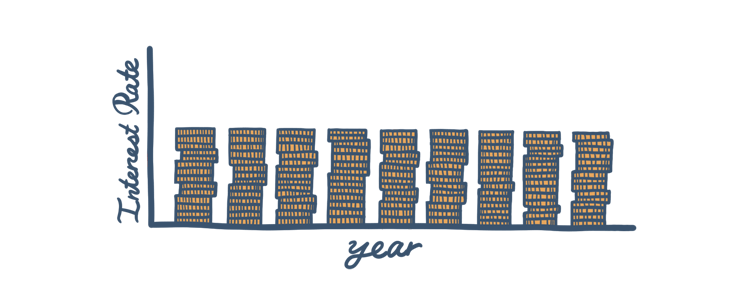Fixed Rate Mortgage

As the name would suggest, the interest rate on a fixed rate mortgage stays the same throughout the life of the loan, and consequently, so do the minimum monthly payments.
The FHA’s fixed rate mortgages are a popular option for many homebuyers as they come with the same flexible guidelines as other FHA programs, namely the 3.5% down payment requirement and 580 minimum credit score. The fixed rate mortgages have either 15 or 30-year terms. While 30-year terms are the most popular, 15-year fixed rate mortgages typically have lower interest rates with higher monthly payments, but more of the money goes toward the principal every month.
Eligibility
In order to qualify for an FHA fixed rate mortgages, it’s important you know the basic requirements:
- Your debt-to-income ratio must fall at or under the FHA’s maximum qualifying ratio of 43%.
- You must have a credit score of at least 500.
- You qualify for a 3.5% down payment if your credit score is 580 or higher, or a 10% down payment if your credit score is between 500-579.
- The house you buy must be a 1- to 4-unit structure that serves as your primary residence and meets the FHA’s minimum property requirements.
The Pros
A fixed rate loan can be a surefire choice for many borrowers because of the certainty it comes with.
- A fixed rate loan means no surprises. You know exactly what your monthly payment is going to be for the life of the loan, making it easier for you to budget your income.
- Borrowers with fixed rate mortgages are protected from the uncertainty of a fluctuating market. Even if interest rates skyrocket, your rate is locked in for the entire term.
- The fixed rates make it easier to shop around for loans, because you can simply calculate your monthly payments and make the best choice.
The Cons
The inflexibility of fixed rate mortgages may not work out for all homebuyers.
- With fixed rate loans, timing can work against you. You may feel you’re getting a low rate at closing time, but a few months down the line the rates may drop further.
- Refinancing for a lower rate may be expensive and ultimately cost you more in the long run.
- Fixed rate mortgages generally have higher interest rates than ARMs, and if you end up selling or refinancing in the first few years, your interest payments would have to be higher.

FHA Loan Articles
November 22, 2023In the last days of November 2023, mortgage loan rates flirted with the 8% range but have since backed away, showing small but continued improvement. What does this mean for house hunters considering their options to become homeowners soon?
November 4, 2023In May 2023, USA Today published some facts and figures about the state of the housing market in America. If you are weighing your options for an FHA mortgage and trying to decide if it’s cheaper to buy or rent, your zip code may have a lot to do with the answers you get.
October 14, 2023FHA loan limits serve as a crucial mechanism to balance financial sustainability, regional variations in housing costs, and the agency's mission to promote homeownership, particularly for those with limited financial resources.
September 25, 2023Mortgage rates are hitting prospective homeowners hard this year and are approaching 8%, a rate that didn't seem very likely last winter. With so many people priced out of the market by the combination of high rates and a dwindling supply of homes.
September 19, 2023The FHA Handbook serves as a crucial resource for mortgage lenders, appraisers, underwriters, and other professionals involved in the origination and servicing of FHA-insured home loans. It outlines the policies and requirements for FHA-insured mortgages.
September 13, 2023FHA rehab loans are a specialized type of mortgage loan offered by the Federal Housing Administration that allows borrowers to finance both the purchase or refinance of a home and the cost of needed repairs.








